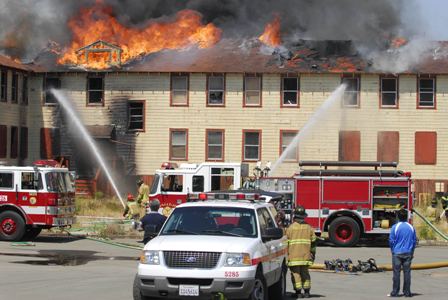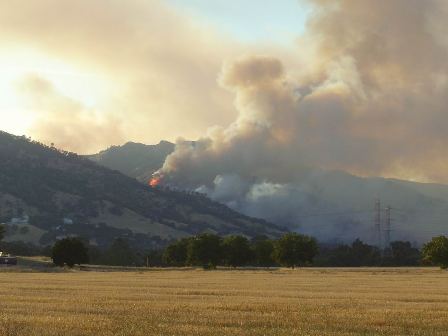| | | Structure Fires and Wild Land Fires Structure Fire
If your smoke detector goes off or you see a fire: - Remain calm and get out.
- If you see smoke under the door, find another way out.
- Feel the door with the back of your hand before you open it. If it is hot, find another way out.
- Drop to the floor to avoid smoke and fumes. Crawl to safety.
- If your clothes catch on fire, STOP where you are, DROP to the ground, and ROLL over and over to smother the flames.
- Call 9-1-1 from a safe location.
- If you are trapped in a burning building, stay near a window and close to the floor. If possible, signal for help.

Preparing for Wildland Fire Imagine the devastation a wildfire would bring upon your family as it sweeps through your property destroying your home and all your families’ belongings. The plans you make now could greatly reduce your risk for devastation. Defensible space and maintenance of your property is the key. - Remove tall dry grasses and weeds. Clear tall grasses and weeds 100 feet from your home. These can provide a path for fire that can lead directly to your home.
- Remove dead or overhanging branches. During the windy conditions that exist during a wild land fire, flames sparks and firebrands could travel from the tree to the roof of your home or structure.
- Remove leaf accumulation from your yard. Leaf accumulation provides fuel for a wild land fire.
- Remove leaf clutter from your roof and gutters. During a wild land fire, leaves on the roof and gutters could be ignited by flying timbers.
- Remove “ladder fuels”. Prune tree limbs so the lowest is between 6’ to 10’ from the ground. Fire burning through tall dry grass could ignite these limbs and climb to the top of the tree with relative ease.
- Check your generator and/or hose to be sure it is in good repair. Refuel garden equipment carefully away from flammable grasses and weeds. Yard equipment needs annual maintenance and proper fueling. Hoses can develop leaks and deteriorate with age and exposure.
- Prune bushes and shrubs regularly. Remove excess growth as well as dead leaves and branches to decrease their flammability, and the threat that they could pose during a wild land fire.
|
| | | |